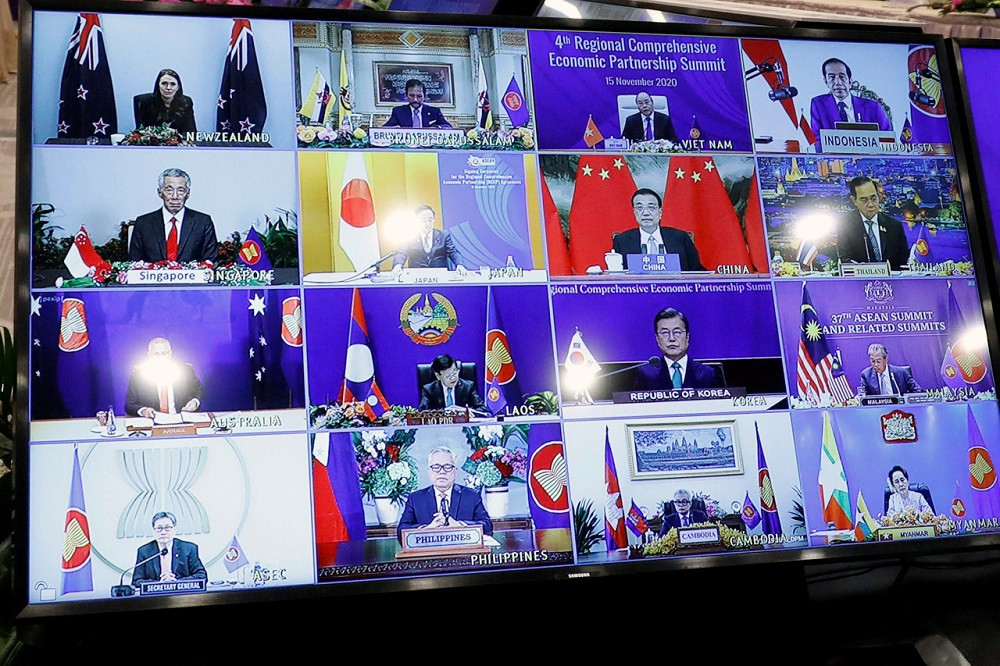Popular Reads
Top Results
Can't find what you're looking for?
View all search resultsPopular Reads
Top Results
Can't find what you're looking for?
View all search resultsProtectionist concerns stall RCEP ratification
Lawmakers fear mega trade pact may increase imports.
Change text size
Gift Premium Articles
to Anyone
I
ndonesia is the only country that has yet to ratify the Regional Comprehensive Economic Partnership (RCEP), with lawmakers expressing their concern that the world's largest trade deal could trigger an influx of imported goods.
The RCEP eliminates up to 92 percent of the tariffs for goods traded among its 15 members and standardizes many customs, investment, intellectual property and e-commerce regulations. Therefore, the House of Representatives' delay is seen by some as depriving Indonesia of the benefits of the mega trade pact, which came into effect on Jan. 1.
The trade pact involves the 10 ASEAN countries plus Japan, South Korea, China, Australia and New Zealand, which collectively represent 30 percent of global gross domestic product (GDP).
Several members of the House Commission VI, which oversees trade and investments, told The Jakarta Post on Jan. 5 that their concerns were primarily over imported goods and how they could impact local businesses, especially micro small medium enterprises (MSMEs).
“[Indonesia] is still seen as a market rather than the one looking for a market. That’s why at every meeting, almost all members conveyed these concerns,” said House Commission VI member Marwan Jafar of the National Awakening Party (PKB) on Jan. 5.
Fellow member Achmad Baidowi from the United Development Party (PPP) pointed out that many local businesses, particularly MSMEs, might be unprepared to face new competition and have yet the capacity to join global value chains.
“This is one of our concerns — that Indonesia should improve its capability first before ratifying the RCEP,” Achmad said.
Similar concerns have been raised by the House’s two largest political parties, the ruling Indonesian Democratic Party of Struggle (PDI-P) and Golkar Party, during a meeting with the Trade Ministry on Dec. 13 last year.
“Free trade does not mean trading freely. There must be a way for us to determine various tactics [to protect local businesses] that will provide various layers of protection to strengthen national products,” said Commission deputy chairman Aria Bima of the PDI-P.
Golkar’s Gde “Demer” Sumarjaya Linggih, another Commission VI deputy chairman, urged policymakers to spur the development of domestic industries once the RCEP was ratified.
“If we cannot develop our industry, then what’s the point of [signing] a trade agreement? We will always become a consumer country,” he said.
Read also: RCEP's fruits come with challenge of keeping China in check
No hard feelings
Despite their concerns, House lawmakers told the Post that they would support ratifying the RCEP, and they did not mind which countries were involved in the pact.
The Office of the Coordinating Economic Affairs Minister said on Jan. 3 that the RCEP was expected to be ratified in the first quarter of 2022.
Meanwhile, analysts say the RCEP could strengthen China’s economic grip on the Asia-Pacific, especially after India withdrew from the trade pact in 2019. China has been criticized for its stance on intellectual property and market-distorting subsidies.
“The [Indonesian] government through Trade Minister [M. Lutfi] has said that this agreement would benefit Indonesia. He guaranteed it in the meeting,” House member Andre Rosiade from the Gerindra Party said on Dec. 5.
Andre went on to say that the government’s target to ratify the RCEP by the first quarter this year was plausible, depending on how deliberations between the House and government progressed.
"In our meetings, we remind [the government] to not let the RCEP bring losses to Indonesia, whether from China or other countries," he added.
The Dec. 13, 2021, meeting concluded that the commission would ratify the RCEP as a law, as opposed to a presidential regulation, but lawmakers say they were still waiting for the government to send a draft bill, deliberations over which would resume in 2022.
“So, if there is a delay, it's because of the delay in the government itself,” said Prosperous Justice Party (PKS) faction member Nevi Zuariana on Thursday.
Read also: Govt urges lawmakers to ratify backlogged trade deals
Govt remains confident
Anne Patricia Susanto, head of the permanent committee on free trade agreements at the Indonesian Chamber of Commerce and Industry (Kadin), contested the House’s concerns, arguing that RCEP negotiators had taken into account both its positive and negative impacts.
“And it has more positive than negative sides. The key lies in the competitiveness of our products against the ones from other countries,” Anne said on Thursday.
“All RCEP countries except Indonesia have ratified [the deal]. Therefore, it is very unfortunate that the trade deal is not being prioritized."
Concurring with Anne, Trade Ministry International Trade Cooperation Director General Djatmiko Bris Witjaksono told the Post on Thursday that there was always a risk in the RCEP, but not joining it could result in greater potential losses if other countries took over Indonesia’s export market.
The government estimated that joining the RCEP could increase Indonesia's GDP growth by 0.05 percentage points in the next decades, while not joining could result in a contraction of 0.07 percentage points.
“We need to account for the opportunity costs should our export market become dominated by other RCEP members,” the Trade Ministry said in a statement.
The ministry also outlined which industries would come under pressure from the RCEP but vowed to mitigate the risks. The industries include telecommunications, information technology, clothing and textiles, footwear, as well as automotive and agricultural products.
In addition, the ministry plans to offset the possible hike in imports by increasing exports in several industries, such as plant-based fibers, pulp and paper, minerals, metals (including ferrous metal), wood products and food products. The plan involves MSME-level businesses.










